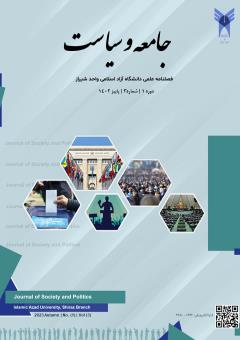An Analysis of the 17th Global Development Program and the Foreign Policy Approach of the Islamic Republic of Iran
Subject Areas : political sociology
majid abdollahi
1
![]() ,
mohammadreza قائدی
2
*
,
mohammadreza قائدی
2
*
![]() ,
مریم مرادی
3
,
حبیب اله ابوالحسن شیرازی
4
,
مریم مرادی
3
,
حبیب اله ابوالحسن شیرازی
4
![]()
1 - Department of International Relations, Qeshm Branch, Islamic Azad University, Qeshm, Iran
2 - دانشیار دانشگاه آزاد شیراز
3 - گروه روابط بین الملل-پردیس بین الملل قشم-دانشگاه آزاد اسلامی-قشم-ایران
4 - Department of Political Science, Central Tehran Branch, Islamic Azad University, Tehran, Iran
Keywords: 17th World Development Program, Foreign Policy, Islamic Republic of Iran,
Abstract :
Governments need regular and codified plans to develop. Also,in the international system for better and more governments to cooperate with each other,the United Nations has developed and presented programs. For example, the 17th World Development Program is one of these measures that have been considered. In the meantime, what helps the faster and coordinated development of countries in line with international programs is an efficient foreign policy.Regarding the importance of foreign policy that regulates relations between countries,it should be said that foreign policy is always a reflection of the nature of the government; The level and depth of change in the foreign policy of the countries is directly related to the form of government system,decision making model, governing norms and principles and numerous environmental components that return the feedback of continuity and change into the system.The main goal of this article is to analyze the role of the 17th World Development Program and the foreign policy of the Islamic Republic of Iran. The main question raised is, what has been the foreign policy approach of the Islamic Republic of Iran for the 17th World Development Program? To answer this question,the descriptive-analytical method has been used, using the findings collected by the library method and internet sites. The results of the findings show that due to the fact that the issue of development is considered in the foreign policy programs of the Republic of Iran, but in line with the seventeen goals of global development, effective measures are not observed in the approach and behavior of the foreign policy.The state of poverty and underdevelopment of some provinces of the country such as Sistan and Baluchistan, environmental indicators in the country (problems of water shortage,drying up of wetlands and lakes) are examples of the lack of an effective approach in foreign policy.
1. اسدی، رمضان اسماعیل و گودرزی، مهناز؛(1397)؛ تأثیر برنامه¬های توسعه¬ای سازمان ملل متحد بر برنامه¬های توسعه جمهوری اسلامی ایران؛ فصلنامه مطالعات روابط بین¬الملل، سال یازدهم، شماره 43، پاییز، صص 47-9.
2. اسماعیلی¬فرد، مریم و همکاران؛(1396)؛ چالشهای دستورکارگذاری محیط¬زیست در ایران؛ فصلنامه علوم محیطی، دوره پانزدهم، شماره 3، پاییز، صص 18-1.
3. اکرمی¬نیا، محمد؛(1392)؛ راهبردهاي سیاست خارجی جمهوري اسلامی ایران در دستیابی به اهداف چشم¬انداز 1400؛ فصلنامه مطالعات راهبردی، سال شانزدهم، شماره دوم، تابستان، صص 60-33.
4. ایمانی، همت؛(1396)؛ نقش سیاست خارجی در توسعه ملی ایران؛ فصلنامه سیاست، سال چهارم، شماره چهاردهم، تابستان، صص 99-79.
5. بهرامی¬احمدی، حمید؛(1388)؛ سياستگذاريهاي سياسي-حقوقي جمهوري اسلامي ايران در حفاظت از محيط زيست؛ فصلنامه دانش سياسي، سال پنجم، شماره اول ـ بهار و تابستان، صص 114-93.
6. جوادی¬ارجمند، محمدجعفر و دیوسالار، عبدالرسول؛(1398)؛ رابطه امنیت و توسعه در سیاست خارجی (مطالعه موردی روابط ایران و شوروی 1357-1340)؛ فصلنامه سیاست، دوره 49، شماره 2، تابستان، صص 332-311.
7. دانش¬نیا، فرهاد؛(1391)؛ دیپلماسی اقتصادي و سیاست خارجی توسعه¬گرا؛ ابزارهاي موفقیت راهبرد توسعه¬اي ج.ا.ا. در اقتصاد جهانی؛ فصلنامه مطالعات راهبردی سیاستگذاری عمومی، دوره 3، شماره 9، تابستان، صص 86-67.
8. زندی، عرفان و ساجدی، امیر؛(1400)؛ جایگاه اقتصادی ایران در خاورمیانه از منظر آینده سیاست خارجی جمهوری اسلامی با تأکید برافق 1405؛ فصلنامه مطالعات بین¬المللی، سال 18، شماره 2، پاییز، صص 141-121.
9. سلیمی، حسین و ایمانی، همت؛(1401)؛ بایسته¬های سیاست خارجی ایران در توسعه فناوری اطلاعات و ارتباطات؛ فصلنامه سیاست متعالیه، سال 10، شماره 38، صص 250-232.
10. عطایی، فرهاد و منصوری¬مقدم، محمد؛(1392)؛ تبارشناسی سیاست خارجی عربستان¬سعودي: راهبردي واقع¬گرایانه بر بستري هویتی؛ فصلنامه روابط خارجی، سال پنجم، شماره اول، بهار 1392، صص 168-133.
11. مجابی، سیدمحمد و اسماعیلی¬فرد، مریم؛(1396)؛ جستاری بر سیاستگذاری محیط¬زيست در جمهوری اسلامی ايران؛ پژوهشکده تحقیقات راهبردی، صص 9-1.
12. محمدیان، رضا و همکاران؛(1400)؛ بازاندیشی مفهوم توسعه سیاسی در گفتمان اصولگرای محمود احمدی¬نژاد؛ فصلنامه سپهر سیاست، سال 8، شماره 27، صص 140-124.
13. معزی، علی و وثوقی، سعید؛(1397)؛ نسبت امنيت و توسعه در سياست خارجي جمهوري اسلامي ايران؛ فصلنامه سیاست جهانی، دورة هفتم، شمارة دوم، تابستان، صص 54-27.
14. میرجلیلی، سیدحسین و همکاران؛(1400)؛ بررسی تطبیقی سیاستهای راهبرد کاهش فقر در کشورهای در حال توسعه و سیاستهای فقرزدایی ایران؛ فصلنامه راهبرد اقتصادی، سال 10، شماره 2، تابستان، صص 423-387.
15. میسایی، قاسم و همکاران؛(1394)؛ جهانی¬شدن در برنامه¬هاي توسعه جمهوري اسلامی ایران (مطالعه (برنامه¬هاي سوم، چهارم و پنجم توسعه ج.ا.ا)؛ فصلنامه پژوهشهاي راهبردي سیاست، سال چهارم، شماره 15، زمستان، صص 68-37.
16. هادی¬زنوز، بهروز؛(1384)؛ فقر و نابرابری اجتماعی در ایران؛ فصلنامه رفاه اجتماعی، شماره 17، تابستان، صص 304-235.
17. یزدان¬فام، محمود؛(1387)؛ مقدمه¬اي بر تحلیل سیاست خارجی؛ فصلنامه مطالعات راهبردی، سال یازدهم، شماره دوم، تابستان، صص 276-247.
18. Carius, Alexander and Ivleva, Daria and Pohl, Benjamin and Ruttinger, Lukas and Schaller, Stella and Tanzler, Dennis and Vivekananda, Janani. (2018). A FOREIGN POLICY PERSPECTIVE ON THE SDGS; https://adelphi.de/en/system/files/ mediathek/bilder/A%20Foreign%20Policy%20Perspective%20On%20The%20Sustainable%20Development%20Goals%20-%20Brief%20-%20adelphi.pdf 19. https://csr.ir/fa/news/1366/%D8%AA%D8%AD%D9%88%D9%84
20. Spohr, Alexandre Piffero & André Luiz Reis da Silva. (2017). Foreign Policy’s Role in Promoting Development: the Brazilian and Turkish Cases; Contexto Internacional vol. 39 (1) Jan/Apr, http://dx.doi.org/10.1590/S0102-8529.2017390100008.
21. Sustainable Development Goals Report (2018). https://unstats.un.org/sdgs/files/report/ 2018/thesustainabledevelopmentgoalsreport2018-en.pdf

